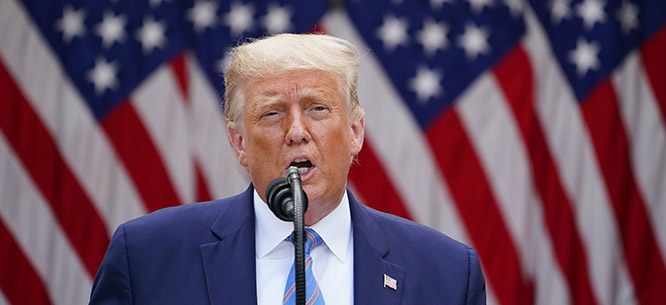Stopping Trump’s Coup
Stopping Trump’s Coup
After a disastrous debate, we need leaders to insist that the republic and the people are bigger and more important than any president.

Tuesday night’s presidential debate can best be characterized by two of Donald Trump’s favorite words: it was a “disgrace” and a “disaster.” Our challenge now is to think not just morally or theoretically but also politically, in the way that Trump himself does.
On the morning of the debate, the New York Times exposed his lifetime of trying to turn thoughtful citizens into consumers whose stresses and resentments he could stoke as he opened their wallets. But if many doubted in 2016 that he could win an election with such tactics, there’s no doubting that now. His debate performance signaled once again that his re-election campaign is becoming an attempted coup d’etat.
In 1941, Francis Hackett, literary editor of the New Republic, published the book What Mein Kampf Means to America. This was before the attack on Pearl Harbor, and before most Americans imagined that they would actually go to war. “Right before our eyes, like something on the screen,” he wrote, “the vast social fabric [of the republic] has crumbled. . . . On its ruins, with the speed of a world’s fair, [Hitler] and his confederates have run up a political front of startling and provocative modernity. . . . [His movement’s] hand has been so much quicker than the democratic eye, and for his violence we have so little precedent.”
But there’s a precedent for countering Trump democratically, with a symbolic declaration that could be as potent as his debate performance: the four living former U.S. presidents—Barack Obama, George W. Bush, Bill Clinton, and Jimmy Carter—should come together to announce their shared conviction that Donald J. Trump is a clear and present danger to the republic. That might help to galvanize sustained, widespread democratic organizing not only in the courts and in some states’ election bureaucracies but also among voters and federal workers within the Post Office and the Department of Justice, among other agencies.
One precedent that I have in mind began with the late writer Jonathan Schell’s 1981 bestseller The Fate of the Earth. It may have persuaded influential American strategists, including former Secretary of State Henry Kissinger, to abandon their long advocacy of tactical nuclear-war strategies that, Schell showed, are little better than catastrophes-in-waiting. On January 4, 2007, Schell had the satisfaction of reading an arresting Wall Street Journal column, “A World Free of Nuclear Weapons,” bylined by Kissinger, former Secretary of State George Shultz, former Secretary of Defense William Perry, and former Senator Sam Nunn, calling for abolition of nuclear weapons and for energetic “actions required to achieve that goal.”
It was a stunning convergence and change of course in strategic thinking. As Schell noted three years later, a “remarkable phalanx of former and current officials, Republican as well as Democratic, have embraced the goal” of abolition. It’s important to emphasize that the four figures whose unexpected opposition to nuclear weapons turned so many heads were former statesmen, safely removed from the partisan and policy risks of “getting to zero” on nuclear arms.
We haven’t gotten to zero, of course. Ultimately, only sustained democratic organizing can do that work. Still, on this eve of a fateful election, a new “remarkable phalanx” of political leaders, speaking the truth about Trump’s coup in the making, might turn many more against it.
No one former president, speaking alone, can persuade enough of a deeply polarized polity to head off what Trump and his followers are planning. Still, flawed though each of these former presidents may have been, each stopped short of tearing apart a democratic consensus that Trump is incapable of imagining, let alone upholding: the consensus that the republic and the people are bigger and more important than any president.
Our four ex-presidents should urge Americans to vote early, as more than a million have already done, or to vote in person on election day, in defiance of Trump’s assaults on the Post Office and of any intimidation by his agents and enthusiasts at the polls, as well as of long lines and other necessary precautions against the pandemic.
Millions of us now need to take what may be this last best chance to prove that the republic isn’t ultimately about Trump or his presidential predecessors, or even Joe Biden, every one of them a carrier and partial casualty of the virus of financial capital that’s enveloping and consuming us. We need prophetic witness like Schell’s to chasten them and to move others to vindicate the humbler, braver Americans whose example we’ll need to follow on November 3.
Jim Sleeper is a writer on American civic culture and politics, the author of The Closest of Strangers and Liberal Racism, and a member of Dissent’s editorial board.






